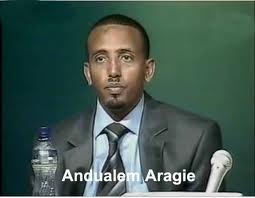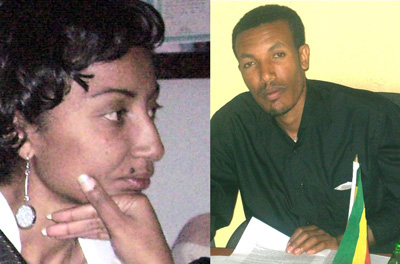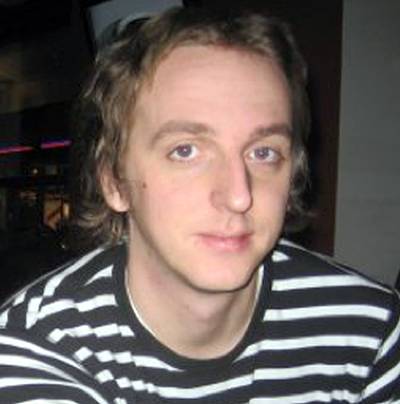 Andualem Aragie, left, vice chairman of the opposition party Unity for Democracy and Justice (UDJ) and executive committee member of Medrek, the largest opposition coalition also two active members of UDJ and the general secretary of the Ethiopian National Democratic Party were detained on September 14, according to Human Rights Watch.
Andualem Aragie, left, vice chairman of the opposition party Unity for Democracy and Justice (UDJ) and executive committee member of Medrek, the largest opposition coalition also two active members of UDJ and the general secretary of the Ethiopian National Democratic Party were detained on September 14, according to Human Rights Watch.
On September 8, the government arrested the popular actor Debebe Eshetu for his alleged involvement in Ginbot 7, a banned opposition group.
All five are being held at the Federal Police Crime Investigation Department, known as Maekelawi prison, in Addis Ababa.
Two leaders of the ethnic Oromo political opposition who were accused of having links with the banned insurgent group, the Oromo Liberation Front (ONLF), were arrested on terrorism charges in August.
Andualem was among the 129 opposition political leaders, journalists, and human rights activists arrested and charged with treason and other crimes in late 2005, following the contested May 2005 national elections. He was subsequently released after a presidential pardon.
The former leader of UDJ, Birtukan Midekssa, who was also among those arrested in 2005, was re-arrested in 2008 and held for almost two years, including for prolonged periods of solitary confinement.
3 journalists face up 20 years in prison
Ethiopian “Feteh” columnist Reeyot Alemu, “Awramba Times” deputy editor Woubshet Taye and Sweden based “Kontinet” reporter Martin Schibbye have all been detained since June. On 6 September terrorism charges were brought against them. They might be imprisoned for up to 20 years if convicted, English PEN reports.
Two independent journalists were arrested this week in Ethiopia on accusations of involvement in a terrorism plot. Journalist of the Addis Ababa-based radio station 96.3 FM Sileshi Hagos was detained by Ethiopian security forces on 9 September.
On 14 September security forces also arrested Eskinder Nega, right, a well-known journalist in Ethiopia for his critical commentary. He was also arrested in 2005 and later released after a presidential pardon.
Since his release Eskinder has faced ongoing harassment, surveillance, and intimidation. The authorities denied him a license to practice journalism.
Tortured in prison
Detained since 19 and 22 June 2011 respectively, Woubshet Taye and Reeyot Alemu, below, appeared before Ethiopia’s High Court on 6 September and were charged under the anti-terrorism law. Their lawyers said they did not have any details about the charges as they were not notified of the hearing and as a result could not attend.
Both journalists are being held at Maekelawi Prison in the capital Addis A baba. Woubshet Taye has reportedly been tortured while Reeyot Alemu’s health is deteriorating rapidly; neither has been given access to medical treatment.
baba. Woubshet Taye has reportedly been tortured while Reeyot Alemu’s health is deteriorating rapidly; neither has been given access to medical treatment.
Terrorism charges were also filed in absentia against Elias Kifle, editor of the Washington-based anti-government website Ethiopian Review; Kifle lives in exile in the USA.
During a court hearing in August, Taye stated that he had been tortured by state officials while he was being interrogated in prison. As of early September, he was reportedly suffering from pain in his ear and stomach as a result of beatings, but had not been given any medical treatment.
The same reports suggest that Alemu’s physical and psychological state of health has seriously deteriorated in prison and she is extremely weak. Her relatives have been allowed to visit her and bring her medicines but she has not received any treatment from doctors. Both journalists say they were denied access to a lawyer during their interrogation. For more details on their arrest, please click here.
 In a separate case, Martin Schibbye, right, reporter for the Sweden-based news agency “Kontinet”, was also charged with terrorism, as well as violation of migration laws, on 6 September 2011. He was charged along with a photojournalist for the same agency, Johan Persson. Their lawyers were reportedly not present at the hearing.
In a separate case, Martin Schibbye, right, reporter for the Sweden-based news agency “Kontinet”, was also charged with terrorism, as well as violation of migration laws, on 6 September 2011. He was charged along with a photojournalist for the same agency, Johan Persson. Their lawyers were reportedly not present at the hearing.
Schibbye and Persson were arrested by Ethiopian security forces on 30 June 2011 while reporting on the activities of the Ogaden National Liberation Front (ONLF), armed separatists operating in the oil-rich province of Ogaden in eastern Ethiopia.
Send an appeal!
English PEN fears that the three journalists are being targeted for their critical reporting in violation of their right to freedom of expression and calls to send appeals protesting the terrorism charges brought against the journalists. Find the details here.
“We are therefore calling on the Ethiopian authorities to drop the charges and release them, and in the meantime ensure that Alemu and Taye are given immediate access to the medical treatment they require”, says English PEN press release.
Background
Ethiopia’s anti-terrorism law, which criminalises any reporting deemed to ‘encourage’ or ‘provide moral support’ to groups and causes which the government considers to be ‘terrorist’, has been widely criticised as being vaguely worded and catch-all. It carries sentences of up to 20 years in prison.
The anti-terrorism law contains an overbroad and vague definition of terrorist acts and makes the publication of statements “likely to be understood as encouraging terrorist acts” punishable by imprisonment for 10 to 20 years. The government is exploiting the law’s overly broad language to accuse peaceful critics, journalists, and political opponents of encouraging terrorism.
Under this law, suspects can be held in custody for up to four months without charge. This is contrary to the Ethiopian constitution, which provides that suspects in detention should be charged or released within 48 hours, and violates international due process standards.
Related articles:
Ethiopia: two local and two Swedish journalists detained without charge
Ethiopian government arrests members of opposition to prevent protests
Freedom of expression under increasing pressure in Ethiopia
Ethiopia jails editor whose paper challenged Meles Zenawi
Opposition leader arrested, leading HR defender beaten in Ethiopia
The freedom of press in East and Horn of Africa remains worst in the world
East and Horn of Africa – the most dangerous region for journalists
The UN Committee Against Torture alarmed by severe human rights violations in Ethiopia


